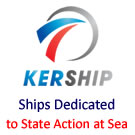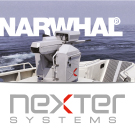The Italian Navy and Fincantieri celebrated held a launch ceremony of the LSS "Vulcano" logistic support ship at Fincantieri’s shipyard in Muggiano (La Spezia).on June 24, 2018.
 Launche of LSS Vulcano. Italian Navy picture.
Launche of LSS Vulcano. Italian Navy picture.
The ceremony was attended by the Italian Minister of Defense, Elisabetta Trenta, welcomed by the Chief of Staff of the Navy, admiral Valter Girardelli and the managing director of Fincantieri Giuseppe Bono. The "Vulcano" logistical support ship (LSS) is being constructed (now in fitting out) by Fincantieri as part of the plan for the renewal of the Italian fleet (called naval law). Also present were the Chief of Defense Staff, General Claudio Graziano, the President of Fincantieri, Ambassador Giampiero Massolo, and the civil and religious authorities.
In his speech, the Minister of Defense stressed: "we need a naval instrument that ensures constant presence aimed at sea control, security of commercial communication lines, monitoring of maritime activities, deterrence and the fight against illegal activities, international cooperation and training".
The admiral Girardelli talking about the new unit: "Vulcano demonstrates once again the excellence of Italian products and the high professionalism, competence, ability and preparation of our industry".
Vulcano is 192 meters long and can reache a top speed of 20 knots. The fundamental characteristic of the unit is the very high level of innovation that makes it extremely flexible in the various profiles of missions, with a high degree of efficiency. In particular, it presents a dual employment profile, the typically military one and the one in favor of the community (such as for civil protection operations/disaster relief); in addition it has a low environmental impact, through advanced auxiliary propulsion systems with low pollutant emission (electric motors).
Thus, the Chief of Defense Staff, General Graziano: "Vulcano ship will contribute to extend the projection capacity of our military instrument, through characteristics of strategic versatility and operational flexibility to the advantage of naval training engaged in international operational contexts"
Video on LSS Vulcano launch ceremony
Vessel’s characteristics - LSS – Logistic Support Ship
The LSS is a vessel that provides logistics support to the fleet, endowed with hospital and healthcare capabilities thanks to the presence of a fully equipped hospital, complete with operating rooms, radiology and analysis rooms, a dentist’s office and hospital rooms capable of hosting up to 12 seriously injured patients. The ship is capable of combining capacity to transport and transfer to other transport vessels used for liquids (diesel fuel, jet fuel, fresh water) and solids (emergency spare parts, food and ammunitions) and to perform at sea repairs and maintenance work for other vessels. The defense systems are limited to the capacity of command and control in tactical scenarios, communications and dissuasive, non-lethal defense systems. The vessel is also capable of embarking more complex defence systems and becoming an intelligence and electronic war platform.
• 193 meters long
• speed of 20 knots
• 200 persons including crew and specialists
• 4 replenishment station abeam and 1 astern
• Capacity to supply drinking water to land
• Capacity to provide electricity to land with 2500 kw of power
• Possibility of embarking up to 8 residential and healthcare modules
• Capacity to perform rescues at sea, through recovery and seabed operations (the ship is equipped with an 30 tons offshore stabilized crane stabilized)
• base for rescue operations through helicopters and special vessels
The stern section was built at the Riva Trigoso Naval Shipyard and the bow section was built at the Castellammare di Stabia (Naples) Naval Shipyard. A5335 Vulcano is set to enter in service with the Italian Navy (Marina Militare) in 2019 to replace Stromboli (A5327) and Vesuvio (A5329) AORs.
 Computer rendering of LSS Vulcano. Italian Navy image.
Computer rendering of LSS Vulcano. Italian Navy image.
FLOTLOG: France procuring 4 LSS based on Vulcano design
The merger between France's Naval Group and Fincantieri went on track following a high level ministerial meeting held in Rome on February 1st 2018. The first concrete symbol from this merger is set to be the procurement by France of four Vulcano class LSS Logistic Support Ships as part of the FLOTLOG programme. The three remaining Durance-class replenishment oilers (Var, Marne and Somme) of the French Navy (Marine Nationale) will be replaced with four Vulcano-class LSS. French President Macron announced earlier this year that the "replenishment oilers would be replaced and their number increased". Construction of the first French LSS could start around 2020 at St Nazaire / STX shipyard. The first two units could be delivered in 2023 and 2025. The third LSS is set to be delivered in 2027 and the last and fourth one in 2029.
Back in September 2017, the French procurement agency awarded a contract to Naval Group to "study the adaptation of the Italian Vulcano design to the French Navy needs". Navy Recognition contacted the French procurement agency DGA (back in Semptember) for further details:
Question: What is the scope of this contract study, what is asked of Naval Group?
DGA: Naval Group and STX France (St-Nazaire) are working in co-contracting on this study, which aims to compare the architecture of the Italian ship with the operational needs of the French navy and the technical reference of the DGA. The challenge is to be able to then determine which parts of the Italian vessel can be left unchanged, and which French specificities will require an adaptation of the Italian design to be taken into account.
Question: Does the DGA continue to work on the BRAVE* design?
DGA: This design corresponds to the architecture resulting from the French preliminary studies, before the cooperation with Italy was envisaged. The DGA no longer works on the basis of this sketch. Nevertheless, some specific parts of this design may be reused, especially in cases where the corresponding parts of the Italian ship do not meet French requirements.
Question: Has the BRAVE design ever been tested in a test tank?
DGA: Numerical calculations and tests with scale models were carried out at DGA Techniques hydrodynamiques: stability, maneuverability, seaworthiness. It is in particular from these studies and tests that the BRAVE design was proposed by Naval Group and STX France.
We also contacted OCCAR, which manages the Italian LSS Programme. An OCCAR representative explained "The LSS Programme was integrated into OCCAR in 2015 with the initial participation of Italy and the potential participation of France. France is currently in the integration process into the Programme. The current industry contract for Italy includes the development and production of one ship and the in-service support for ten years. Its delivery is planned for 2019. When France has joined the programme and the results of ongoing analysis are available, the contract for France will be awarded by OCCAR".
*The BRAVE (Bâtiment RAVitailleur d'Escadre) design was unveiled by DCNS during Euronaval 2010. A significantly updated design was rolled out during Euronaval 2012. And the last time we heard about the BRAVE project was in 2015, with DCNS working on a "full electric" variant".
Basic specifications compared:
Durance-class: Dimensions: 157 m x 21 m | Displacement: ~ 17,900 t | Speed: 19 knots | Crew : ~ 170 +45
BRAVE (baseline 2010): Dimensions: 195 m x 28 m | Displacement: ~ 30,000 t | Speed: > 19 knots | Crew : ~ 100 + 100
BRAVE (full electric 2015): Dimensions: 198 m x 28,5 m | Displacement: ~ 33,000 t | Speed: > 20 knots | Crew : ~ 125 + 100
LSS Vulcano: Dimensions: 193 m x 24 m | Displacement: ~ 27,200 t | Speed: > 20 knots | Crew : ~ 200 (total)










